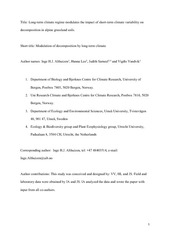| dc.description.abstract | Decomposition of plant litter is an important process in the terrestrial carbon cycle and makes up approximately 70% of the global carbon flux from soils to the atmosphere. Climate change is expected to have significant direct and indirect effects on the litter decomposition processes at various timescales. Using the TeaBag Index, we investigated the impact on decomposition of short-term direct effects of temperature and precipitation by comparing temporal variability over years, versus long-term climate impacts that incorporate indirect effects mediated through environmental changes by comparing sites along climatic gradients. We measured the initial decomposition rate (k) and the stabilization factor (S; amount of labile litter stabilizing) across a climate grid combining three levels of summer temperature (6.5–10.5°C) with four levels of annual precipitation (600–2700 mm) in three summers with varying temperature and precipitation. Several (a)biotic factors were measured to characterize environmental differences between sites. Increased temperatures enhanced k, whereas increased precipitation decreased k across years and climatic regimes. In contrast, S showed diverse responses to annual changes in temperature and precipitation between climate regimes. Stabilization of labile litter fractions increased with temperature only in boreal and sub-alpine sites, while it decreased with increasing precipitation only in sub-alpine and alpine sites. Environmental factors such as soil pH, soil C/N, litter C/N, and plant diversity that are associated with long-term climate variation modulate the response of k and S. This highlights the importance of long-term climate in shaping the environmental conditions that influences the response of decomposition processes to climate change. | en_US |
